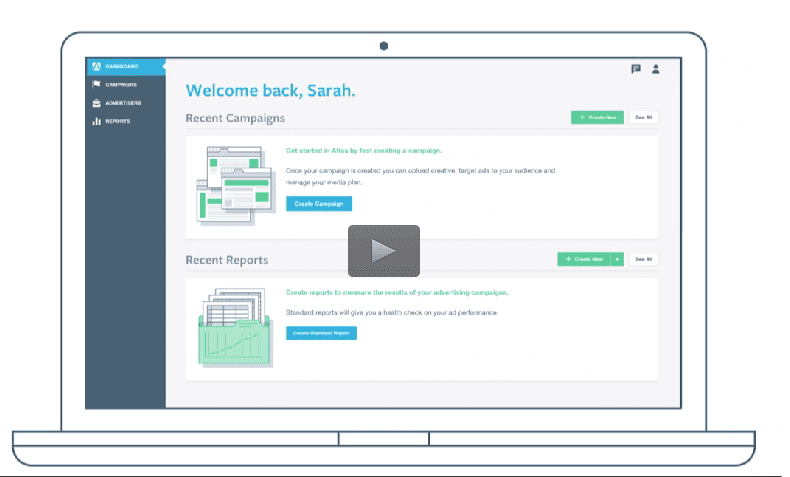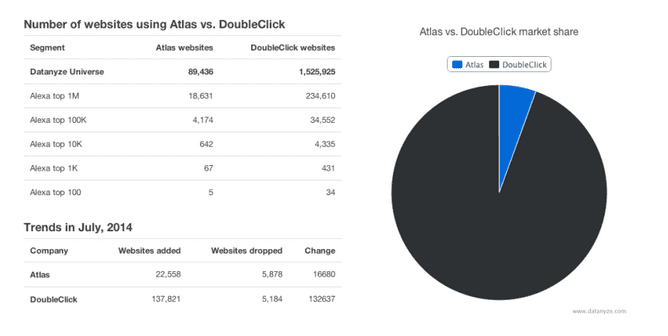What are the advantages and disadvantages of using Facebook's new ad network?
Importance: [rating=1] Current importance to small, mid-size businesses.
Value: [rating=4] for larger businesses and brands.
Recommended link: Facebook Atlas announcement

What is Facebook Atlas?
1. Atlas is not a new service
There has been a lot of hype around Facebook's recent re-launch of Atlas which you may know as an ad-serving product which has been used for managing display campaigns by large media companies for many years. Facebook purchased the Atlas ad server from Microsoft in early 2013 and are building it into their ad offering.
2. Atlas will offer targeting based on Facebook profile information and remarketing across publisher sites
Atlas will enable targeting of audiences on publisher sites based on their Facebook demographics and interests. Remarketing or retargeting should also be possible - this is an established approach by brands to offer people reminders about products or services. It's unclear whether this will include retargeting when someone has viewed a Facebook page or targeting based on a site user journey on a company website - it's not clear that it integrates with Facebook custom audiences of FBX yet.
3. Atlas does not use cookies for attribution
Atlas uses a technique to track visitors across devices that they call "People-based marketing" which doesn't rely on cookies, but Facebook ID. This will only be effective when people are signed-in to Facebook on a device.
4. Atlas tracking enables cross-device tracking and links to offline sales to be established
Atlas says:
"We’ve rebuilt Atlas from the ground up to tackle today’s marketing challenges, like reaching people across devices and bridging the gap between online impressions and offline purchases".
This is one of the reasons that makes the Atlas approach compelling for the brands who can use it. Again it is unclear how accurate linkage to offline purchases will be.
5. Atlas is not integrated with Facebook's main advertising programme
It might seem as if Atlas is tightly integrated with Facebook's other ad programmes, but it is a standalone service. Indeed if you check out Atlas, you will see that it runs on a completely separate site.
6. Atlas is not an all-comers self-service platform
Another detail that most news coverage of the new feature has failed to mention is that Atlas looks to be only for larger companies. If you want to use the service you have to apply via a sales team quoting your monthly ad spend. We haven't heard back from our request...
7. Atlas will help with attribution modelling
One of the other key benefits of Atlas is that it will help with attribution modelling. It's positioned as tracking the impact of ads that users see on Facebook and other sites, providing metrics across different devices as it 'targets ads on real people based matching and not just cookies', based on the Facebook ID.
8. Atlas has limited reach compared to GDN and Doubleclick
Many are comparing Atlas to Google's DoubleClick Campaign Manager. Yet while Google's Display Network reaches over 2 million publishers and 90% of web users worldwide, the proportion is much lower for Atlas (sub 10%). It would seem that GDN also works better for remarketing following a visit to a specific part of a companies website rather than Facebook Atlas. This analysis reported by RKG shows the limited reach of Atlas.

9. Current Atlas users are big brands and big agencies
Atlas has signed an agreement with media agency Omnicom to enable more automated capabilities for Omnicom’s clients, including Pepsi and Intel, who are among the first testing the new platform.
10. Smaller businesses cannot currently use the service
We feel that Atlas is definitely an paid media option to watch, particularly for larger businesses, but for smaller businesses, it's less relevant since you or your agency can't currently signup on a self-serve platform like Google's remarketing (if you signup on the Atlas site you have to go through a sales/qualification process).
The privacy implications are also unclear, but given Facebook's previous track record on respect for user privacy, we can expect a privacy backlash.






